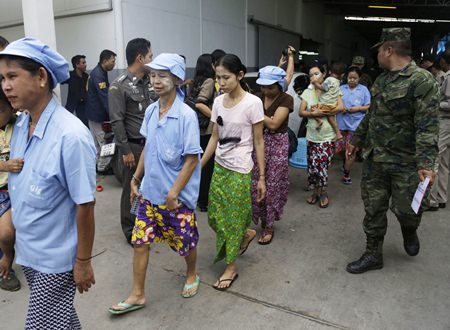Bangkok (AP) – Thailand’s government said Monday it is not ignoring the slavery and forced labor in its lucrative shrimp industry that was highlighted in an Associated Press investigation published last week.
Government spokesman Sansern Kaewkamnerd, flanked by police, navy and other officials, held a news conference specifically to address issues raised by the AP story. The report has elicited widespread reactions around the world, including from major food companies in the U.S., Europe and Australia that buy Thai seafood.
Sansern said the government was already aware of slavery in the industry before the AP report was released Dec. 14.
 In this Monday, Nov. 9, 2015, file photo, Burmese workers are escorted by soldiers and police officers as they leave a shrimp shed after a raid conducted by Thailand’s Department of Special Investigation in Samut Sakhon, Thailand. (AP Photo/Dita Alangkara, File)
In this Monday, Nov. 9, 2015, file photo, Burmese workers are escorted by soldiers and police officers as they leave a shrimp shed after a raid conducted by Thailand’s Department of Special Investigation in Samut Sakhon, Thailand. (AP Photo/Dita Alangkara, File)
“The report said that government officials ignore (this matter) … This is not the truth,” he said. “Authorities found it first,” he said, adding that the Thai government wants the shrimp industry to have “proper working conditions according to international laws.”
Thailand is one of the world’s biggest shrimp providers and its seafood export industry is estimated to bring in about $7 billion annually.
The AP report revealed the widespread use of undocumented migrant laborers, many from neighboring Myanmar. Many of these laborers end up being tricked or sold into shrimp-peeling sheds where they are forced to work 16-hour days with no time off and little or no pay for sometimes years at a time.
Many workers are held under debt bondage, forced to repay money the company gave to the agents who sold them. Some end up locked inside. Others are allowed to go out, but only if they leave their children or spouse behind as a guarantee against running away.
At the news conference Monday, government officials did not deny the existence of forced labor. But they disputed parts of the story, especially the AP’s assertion that police took bribes and turned a blind eye to the practices in the industry.
“This is not true,” Sansern said without elaborating.
 In this image made from video, Thai Police Maj. Gen. Kornchai Klaiklung, left, the head of the anti-human trafficking wing of the police, and government spokesman Sansern Kaewkamnerd, right, speak at a news conference in Bangkok, Monday, Dec. 21, 2015. Thailand’s government said Monday it is not ignoring the slavery and forced labor in its lucrative shrimp industry that was highlighted in an Associated Press investigation published last week. (AP Photo/APTN)
In this image made from video, Thai Police Maj. Gen. Kornchai Klaiklung, left, the head of the anti-human trafficking wing of the police, and government spokesman Sansern Kaewkamnerd, right, speak at a news conference in Bangkok, Monday, Dec. 21, 2015. Thailand’s government said Monday it is not ignoring the slavery and forced labor in its lucrative shrimp industry that was highlighted in an Associated Press investigation published last week. (AP Photo/APTN)
The AP stood by its report, part of a series of investigations this year into slavery in the fishing industry in the region. More than 2,000 trapped fishermen were freed earlier this year from an island in Indonesia as a result of the AP’s work. The reports also have led to a dozen arrests, millions of dollars’ worth of seizures and proposals for new federal laws.
“We stand firmly behind our reporters’ coverage, which has been scrupulous, thorough and fair,” said Paul Colford, an AP vice president and director of media relations. “Their stories exposing the enslavement of workers in the Southeast Asian fishing industry have been a source of great pride throughout The Associated Press.”
The AP focused last week’s story on a shrimp shed southwest of Bangkok in Samut Sakhon, the heart of the country’s shrimp processing industry. The shed was raided last month after a worker escaped. But while several undocumented workers were detained, no one with the company was arrested on human-trafficking charges, and the shed reopened days later.
Police in Bangkok have since ordered local authorities to re-investigate the shed for human trafficking. Arrests have been made, the shed has been closed and Samut Sakhon police have held a meeting to explain human-trafficking laws to shed owners.
The story noted that the government has recently passed laws to crack down on abusive employers, but also revealed gaps in those efforts, with some former slaves saying police sold them to agents to be trafficked again.
Sansern also took issue with the AP’s statement that human trafficking “has helped turn Thailand into one of the world’s biggest shrimp providers.”
The AP report also pinpointed the case of a man and his pregnant wife from Myanmar who had been trapped with nearly 100 other Burmese migrants, including children who worked alongside them. Among them was a girl so small she had to stand on a stool to reach the peeling tables.
Sansern said there might be five or 10 people like that couple, “but they don’t represent all 3 million migrant workers that Thailand looks after.”
Sansern said pictures showing children seated with parents at the work table reflects “Asian lifestyle” and not necessarily child labor. But he added that this needs to change and said authorities are now allocating space for children away from the work area.
Kornchai Klayklueng, the head of the anti-human trafficking wing of the police, told the same news conference that “a number of things, including the report about debt-bound laborers, interest us, and we are looking into it and will prosecute” the culprits.
A day after the AP report, Thiraphong Chansiri, the president of Thai Union, one of the world’s biggest seafood exporters, expressed frustration and promised change. He said the AP investigation should be a “wake-up call” to the industry. Many exporters have bought shrimp from, or outsourced peeling work to, smaller operators who have less oversight.




